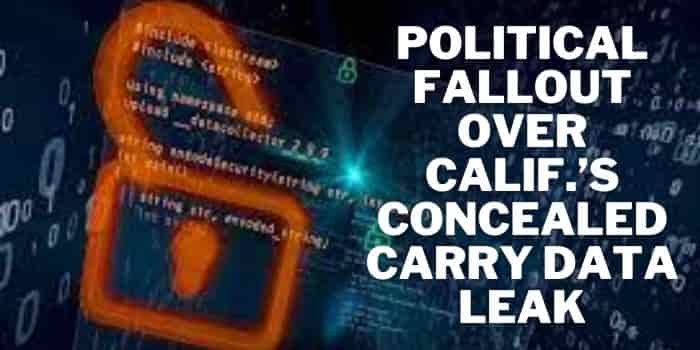California’s Department of Justice angered Tim Sylvester, a self-described gun collector in northern California’s Central Valley, when it unveiled the personal information of perhaps hundreds of thousands of gun owners, likely including Sylvester’s own.
Sylvester, an almond and grape farmer who taught firearm safety classes for several years, told RealClearPolitics that it’s a breach of trust. You made it readily available, and someone decided to misuse it. It’s incorrect.
Last week it was revealed that the California Department of Justice had been illegally sharing the personal information of concealed carry permit holders with federal agents. This Political fallout over Calif.’s concealed carry data leak has created a firestorm of controversy, with many people questioning the department’s motives for releasing such sensitive information.
The department has claimed that the release of this data was accidental and that no malicious intent was involved. However, many gun-rights advocates are not convinced and believe that this was a deliberate attempt to undermine the Second Amendment rights of law-abiding citizens.
This incident is just the latest in a long line of attacks on gun rights in California, and it is clear that the state’s liberal politicians are determined to erode our right to bear arms. It is more important than ever that we stand up and fight for our constitutional rights, and ensure that our voices are heard loud and clear.
Bodta, who’s leading a promotional bid for reelection next month, is embittered and disturbed by the state government’s noncompliance with its statutes in the aftermath of laws requiring the recording of firearm information.
California may be one of the most difficult states to qualify for a permit to carry a concealed weapon because its residents need to be 18 years of age or older and undergo thorough background checks. Residents must also have completed firearms training and passed a competency test.
Whatever expectations we may have regarding the protection of Baldta’s personal information, the commission has regrettably failed to meet those expectations. As the department announced that the break occurred during an update of the state’s Firearm Portal on Monday, this breach does not seem to be an intentional action. Instead of revealing whose information had been exposed, he became involved in an internal, thorough investigation and provided re-profiled customers with personal credit monitoring services to guard against thievery online.
The California Rifle and Pistol Association denounced the release of these data as not simply a violation of the organization’s belief but an unlawful privacy invasion on the scale of the matter.
The news came only a few days after the U.S. Supreme Court threw out New York’s requirement that the bearer of holster-carried weapons provides an explanation. The court’s decision nullified California’s similar requirement, prompting State Senator Bob Bonta and state regulators to craft regulations that could pass the court’s new stricter threshold.
Laws that require residents to prove strong reasons to law enforcement in order to own a weapon could pose new legal challenges to the tightening of regulations on firearm ownership in California.
Gavin Newsom, Governor of California, called the court’s concealed-carry decision reckless and radical while vowing to work with the Legislature to strengthen the state’s public carry law to meet the ruling.
During the exact same week the Political fallout over Calif.’s Concealed carry data leak occurred, Newsom approved 2 of 16 new gun-related bills. The two he signed into law would prevent the advertising of weapons to minors and destroy more illegal ghost guns, which are intentionally made untraceable, as well as the parts that are needed for assembling them.
Newsom thanked legislators for passing the Bill of Purchaser Profits as well as the way citizens drafted it. It’s a version of the law originating from the state of Texas permitting people to levy lawsuits on professionals performing abortions, which was affirmed by the Supreme Court earlier this year.
The Supreme Court is incapable of upholding this law, Governor Newsom pointed out in an October speech. It’s literally devoid of any similarities to the Texas law the Supreme Court just upheld.
The California Concealed Carry Association, which assists those who are seeking concealed carry permits, argued that the timing of the data breach was not suspicious and requested an independent investigation by an unaffiliated entity.
Fortunately, they believe the release of private information was an instance of human error. Nonetheless, there are severe repercussions for copying and distributing firearms without complying with the state s firearm laws, as the Department of Justice said in the statement.
Chris Picou, the CEO of the coalition, expressed particular concern about applicants whose permits were denied and for victims of rape and sexual harassment hoping to carry firearms so that they can feel safer. He feels like criminals can now criminally target homeowners’ houses to obtain weapons, or that individuals with concealed-carry permits could be considered disloyal to employers by anti-gun co-workers or co-workers.
“Now their information is exposed,” he told RealClearPolitics. “This is something that you can’t take back.”
Firearm sales skyrocketed during the COVID-19 pandemic and following the 2020 riots and civil unrest in cities across the country after the murder in Minneapolis of George Floyd by a municipal police officer.
A trade association named America’s Small Arms Analyses & Forecasting predicted that 22.8 million firearms would be sold in the U.S. during 2020, then 19.9 million firearms in 2021. The numbers exceeded 16.7 million firearms sold between 2016 and 2021.
Many of these new applicants for gun permits and concealed carry training are women and minorities living in some of the biggest cities in the country, such as Chicago and Detroit, Picou says.
“We’re seeing an incredible increase in female students in our classes, as well as African American and Hispanic students,” he said.
California’s Central Valley has become ground zero for hot-button political issues related to data breaches, with the state’s agricultural population further divided between pick-up trucks carrying weapons and affluent citizens whose vehicles include Teslas and other electric vehicles. In the Central Valley, statewide midterm elections will feature a number of highly competitive races.
Rep. David Valadao, a Republican from the California dairy-farming district, represents one of California’s most heavily Spanish-speaking regions, which extends from Bakersfield north to Hanford, Kettleman City, and Tulare.
Featuring a slim margin in his district, Valadao triumphed over the majority of the vote in the 2018 midterm election but was unseated before it was restored in 2020. Standing alone, he voted against the gas tax increase in 2017. Facing Rudy Salas, a pragmatic legislator, he is the only Democrat to disapprove of HB 2293.
By RealClearPolitics, the first report of a security breach led by concealed carry permit holders was widely criticized.
“We need to hold agencies like the DOJ to a higher standard for privacy if they are handling people’s personal data, and my team is actively looking into legislative options to address this issue,” he said.
The Salas campaign did not respond to an interview.
Congressman Nathan Hochman, the Republican nominee for Georgia’s attorney general position, said the corruption in the data breach has severely undermined the general public’s trust in his discretion and abilities to manage information, and he urged voters to punish him at the polls this November.
His lackluster plan to offer free credit-monitoring services is a feeble attempt to cover a potentially fatal wound. Eric Hochman, a former member of the United States attorney’s office in the Central District of California, likened him to trying to patch up a life-threatening wound with a Band-Aid. Should his boss of a big business approve such a subpar performance, the board would likely immediately hold him accountable for it.










